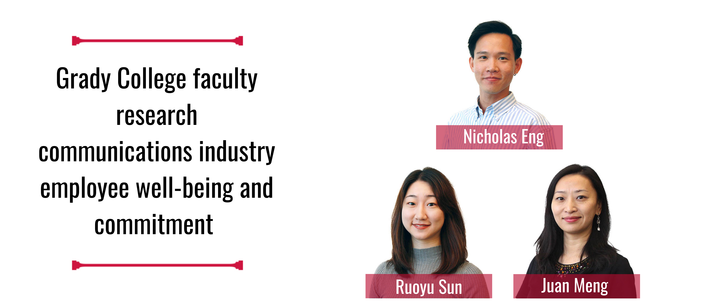Grady College faculty research communications industry employee well-being and commitment

Grady College faculty research communications industry employee well-being and commitment
Nicholas Eng, Ruoyu Sun, and Juan Meng all share a common passion – communications.
In June of 2024, these Grady College professors came together to publish “Promoting employee well-being and commitment in communication industries,” in the Journal of Communication Management.
“It started with the question, ‘what do we know about communications professionals’ mental health, especially with the COVID-19 pandemic?” said Eng, assistant professor in advertising and public relations at the Grady College.
Meng, Grady College head of the Department of Advertising and Public Relations, received a Page Legacy Scholar Grant from The Arthur W. Page Center at The Pennsylvania State University’s College of Communications. This funding helped to make this research project possible.
This research highlights the researchers’ efforts to understand what well-being initiatives and programs exist for communications-industry employees, as well as surveying whether employees are participating in any well-being efforts offered by their employers. Furthermore, the researchers questioned if employees who had higher perceptions of being cared about by their employers through well-being programs, felt more committed to their positions and organizations.
“I wanted to advocate for the prioritization of one’s mental well-being,” shared Eng. “It is something I hold near and dear to my heart.”
To address these questions, the research team surveyed 262 full-time communications industry professionals. Their findings showed “that a variety of well-being initiatives and programs, for example mental health assistance programs and flexible working hours, are offered to communication employees, who receive this information from various sources like emails and announcements at employee meetings. Additionally, the number of well- being initiatives also positively predicted organizational attitudes and attention to mental health in the workplace.” They also found that communications professionals who felt greater support from their organizations also reported higher levels of subjective well-being and organizational commitment.
When asked what impact he hopes this research makes, Eng stated, “I hope that industry-wide changes will occur. Normalizing conversations around communications professionals’ mental well-being benefits both employees and the organization.”
Author: Lauren A. Pike, Lauren.pike@uga.edu